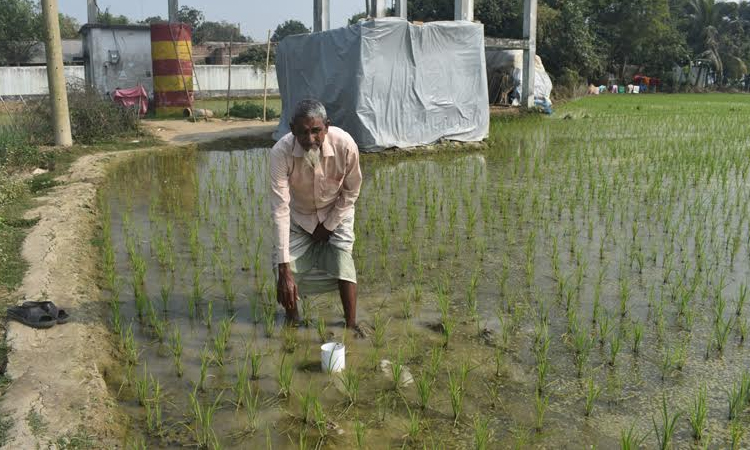News Flash
News Flash

By Md Aynal Haque
RAJSHAHI, Oct 21, 2025 (BSS) - Climate-resilient farming methods, particularly the Alternate Wetting and Drying (AWD) irrigation technique, are proving highly effective in boosting crop yields and conserving water in the drought-prone Barind region, experts say.
The Barind area, already facing the harsh impacts of climate change, has seen a growing push toward sustainable agriculture. Farmers, deep tube-well operators and local stakeholders have been receiving training to adopt climate-smart practices, with promising results already visible on the ground.
During the last Boro paddy season, the AWD method was implemented in 150 demonstration blocks across the region under a specialized project. Comparative assessments showed a clear advantage in fields using AWD over conventional irrigation.
Altaf Hossain, a 54-year-old farmer from Noyagram village, shared his success story with BSS.
"Using the AWD method, I needed only 15 irrigations on my one bigha of paddy land, compared to 22 under traditional methods," he said, adding, "Not only did I save water, but I also harvested four mounds more than before."
From two bighas of land, Hossain harvested 44 mounds of paddy using AWD.
Abdul Matin, another farmer from Hossaindanga village in Chapainawabganj, echoed the benefits. "AWD is a modern, water-saving technology that cuts irrigation costs by Tk 800 to 1,000 per bigha and increases yields by three to five mounds," he said.
This season, over 93 farmers cultivated 115 bighas of land using AWD in the Barind area, significantly easing pressure on groundwater resources. Many others are adopting the technique after being inspired by awareness programs from government and non-government organizations.
The project, titled "Climate Resilient Agricultural Advancement in Barind (CRAAB)," is being implemented in Paba (Rajshahi), Sadar (Chapainawabganj) and Niamatpur and Patnitala (Naogaon). It is led by the DASCOH Foundation, with technical support from the Sustainable Agriculture Foundation Bangladesh (SAF Bangladesh) and financial support from HSBC (Hongkong and Shanghai Banking Corporation Limited) and Syngenta Foundation.
Targeting 25,000 farmers, the initiative aims to strengthen climate-smart agriculture practices, enhance irrigation efficiency and increase farm productivity. The program also works to connect farmers with broader agro-business networks, supporting rural economies.
Akramul Haque, CEO of DASCOH Foundation, stressed the importance of reducing reliance on deep tube-wells, in line with the National Water Policy-2018. He called for investment in agricultural innovation and widespread adoption of sustainable practices.
Farhad Jamil, Country Director of SAF Bangladesh, highlighted that AWD can save at least 30 percent of irrigation water and increase rice output significantly.
"This low-cost, easy-to-adopt method reduces five irrigations per season, saving water, 30 liters of diesel or equivalent electricity and boosting Boro rice yield by around 500 kilograms per hectare," he said.
Experts agree that wider adoption of such technologies is vital to securing food production in regions vulnerable to water scarcity and climate stress.